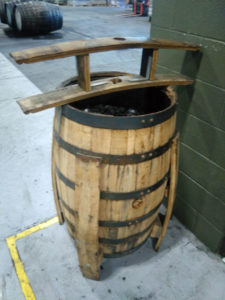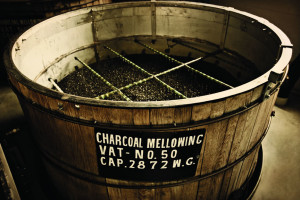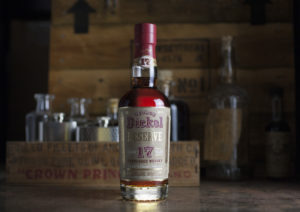By Richard Thomas
Among all the facets of making this or that form of American Whiskey, the least understood by far is the Lincoln County Process (LCP). This is the key characteristic of Tennessee Whiskey, all that really distinguishes it as the major sub-category of bourbon whiskey. Although it has almost as many variants as practitioners in the Volunteer State, the essence of the LCP is the filtration of a new make whiskey through sugar maple charcoal prior to entering it into the barrel.
What exactly the LCP does is what is misunderstood. In books from major publishers and in prominent magazines, on multiple occasions I’ve read from folks who should have known better that the LCP adds sweet, maple flavors to the whiskey. Anyone making such a statement has forgotten not just what everyone who takes the basic tour at the Jack Daniel’s or Cascade Hollow distilleries learns, but also what can be found on the outside of any Brita filter box: charcoal removes impurities from liquids. It doesn’t add them.

Sugar maple charcoal filtration done on a craft scale at Nelson’s Greenbrier
(Credit: Richard Thomas)
The traditional use of sugar maple wood in the LCP, in fact, has nothing to do with maple syrup. Tennessee isn’t Vermont or Quebec, and no one makes maple syrup in the Upper South. That, in fact, is believed to be the reason why 19th Century distillers originally chose sugar maples for making their charcoal: it was a hardwood suitable for charcoaling, but one that (unlike oak) had few other uses, and was thus readily available.
However, most of the science behind the LCP has remained a secret, with the folks at the distillery labs sharing only the most general information gleaned from their frequent and regular tests. That changed this past April, when a study from the University of Tennessee was presented to a meeting of the American Chemical Society.
A team lead by the university’s Dr. John Munafo partnered not with one of the big names in Tennessee Whiskey, Jack Daniel’s or George Dickel, but with Sugarlands Distilling Company in Gatlinburg. Their study began with identifying all the aroma-active molecules in Sugarland’s new make whiskey with gas chromatography-mass spectrometry and gas chromatography-olfactometry, and then evaluated these through aroma extract dilution analysis. After breaking down what was important to the new make whiskey in this way, they repeated the analysis after filtration through sugar maple charcoal, so as to see what was subtracted by the LCP.
Keen observers of the LCP have understood that the purpose of charcoal filtration was to remove certain compounds from the new make whiskey (such as esters and congeners), making the unaged whiskey smoother and more palatable from the get-go. This made the LCP a 19th Century version of the many aging short cuts seen in whiskey-making today, ranging from small barrels to pressurization. The difference is that the LCP actually works, allowing a young whiskey to mellow out a few years ahead of schedule, and the University of Tennessee study provides some hard numbers to support that.
“I was expecting it to have an effect, but I wasn’t expecting as large of an effect as we saw in some of the compounds. For example, levels of some compounds declined by up to 30 percent after LCP,” says Trenton Kerley, a University of Tennessee graduate student who performed the tests.
The trick with the LCP is that the compounds removed also contribute to the flavor of the whiskey as it matures, so subtracting them helps in the short term while hindering the growth of character in the long term. When I mentioned my suspicions on this point to Chris Fletcher, the Deputy Master Distiller at Jack Daniel’s, in relation to how unremarkable the George Dickel 17 Year Old turned out to be, he gave me a wry smile and said “you might be onto something there.” What Munafo and Kerley have done is put some statistics behind those suspicions, and losing up to a third of your whiskey’s congeners and other compounds is as big as deal at 15 years old as it is at 5 years old, albeit in quite different ways.
With this first study out of the way, Munafo and Kerley intend to continue their work. The LCP’s requirements under the 2013 Tennessee Whiskey law are vague: there are no guidelines as to how long the filtration process must take or how often the charcoal must be changed. George Dickel both chills and filters their new make as part of their own spin on the LCP. Future studies by the pair will focus on the finer elements of the LCP, taking more variables into account.








